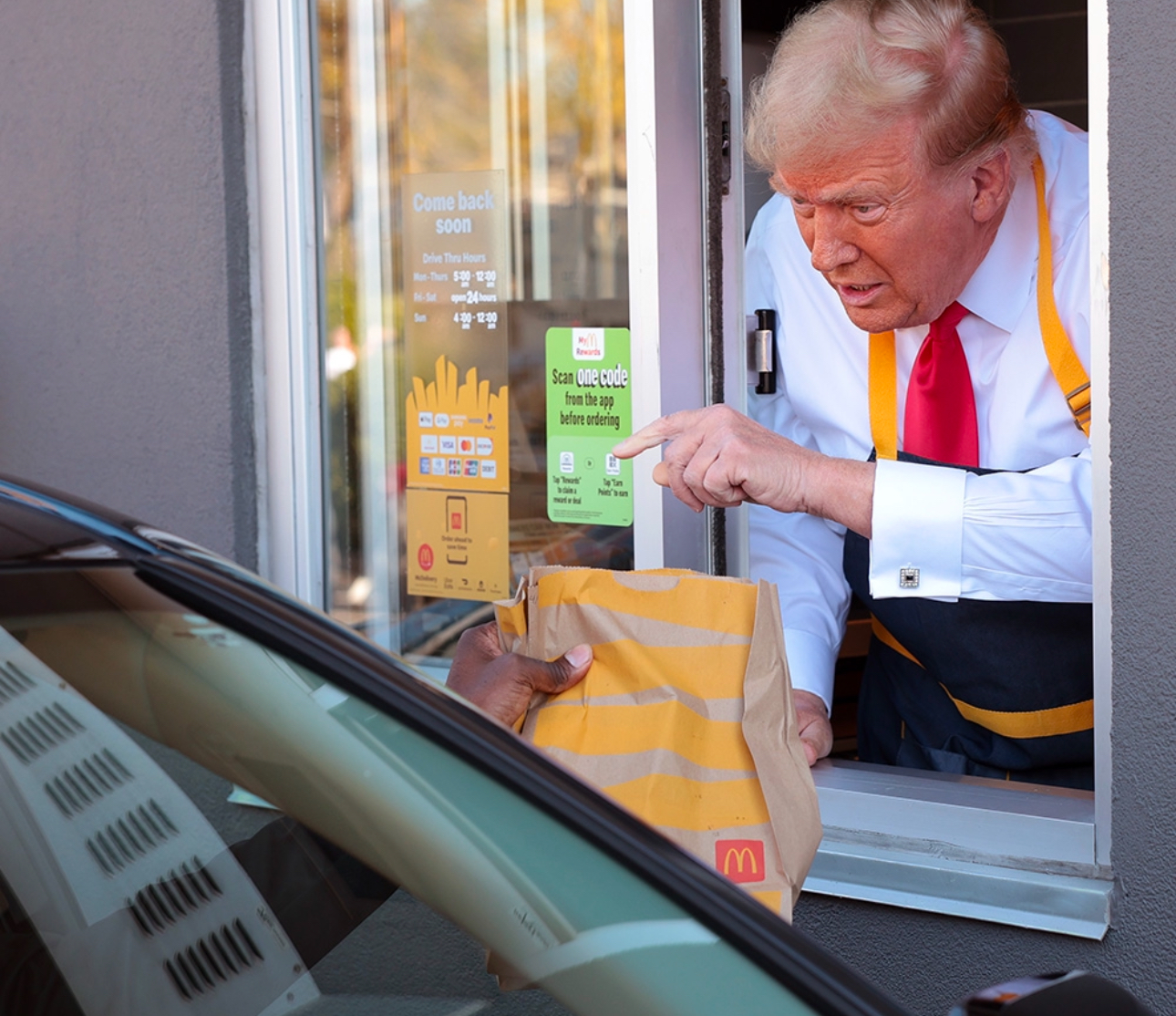October 20, 2024
Former President Donald Trump, known for his unique campaign stops, made headlines again by working a brief shift at McDonald’s in Pennsylvania on Monday. Trump’s visit occurred just before his scheduled Town Hall event in Lancaster, where he took the opportunity to speak with local voters and further solidify his connection with the middle class and blue-collar workers—two key constituencies in his political base.
As Trump handed out food from the drive-through window, he joked with customers and the media, asking, “Should I give them extra salt?” He later remarked, “I’ve now worked for 15 minutes more than Kamala,” taking a jab at Vice President Kamala Harris. His playful comments were met with cheers and applause from a crowd of supporters outside the restaurant. The light-hearted visit seemed to further energize his supporters and highlight his rapport with working-class Americans..
This type of public showmanship is all Trump’s continuing efforts to appeal to the middle class and blue-collar workers who see him as their voice. As a president and during the long vetting process, Trump has attempted to establish himself as the anti-elite candidate, the advocate of common people, and a threat to powerful, well-entrenched forces in Washington, D.C.
Champion of the Working Class
In contrast to Trump’s appeal to the working class, many have noted that the Democratic Party has increasingly become the party of the elite, big corporations, and big government. Once considered the party of labor unions and the working man, the Democrats now face criticism for policies that often align with corporate interests, particularly in sectors like tech and finance. High-ranking Democrats, including President Biden and Vice President Harris, have received significant support from Wall Street and Silicon Valley, further solidifying their image as a party aligned with the wealthy and powerful.
Trump, meanwhile, has emerged as the figurehead for those abandoned by globalization, corporate outsourcing and indiscriminate immigration. His promise to bring back manufacturing jobs, build infrastructure, and protect American workers from foreign competition resonated with voters in the Rust Belt states and across America’s heartland during his 2016 and 2020 campaigns. His connection with blue-collar workers has become a defining feature of his political identity.
In COVID-19, Trump’s quick economic reset was welcomed by small business owners and workers who felt like they couldn’t go back under the government lockdown. His critiques of Democrats’ economic policies (which include high taxes and excessive regulation) appeal to people who feel that the government has become too big and too powerful.
Democrats and the Establishment.
Meanwhile, Democrats have grown a different base, one made up of wealthy donors, scholars and corporate executives favoring progressive social programs and big-government economic policies. Democrats have lost touch with the working class, opponents say, worrying less about the middle class than they do about the needs of big businesses and urban affluents. Climate change, education, and healthcare policies, for instance, focus on regulatory enlargement that will hit small businesses and workers more than can large corporations that could absorb extra costs.
By highlighting these differences, Trump continues to draw a contrast between his movement, which he brands as a populist uprising, and what he characterizes as the Democratic Party’s increasingly elitist tendencies. His campaign stop at McDonald’s serves as a symbolic gesture to further his image as the leader who understands the struggles of everyday Americans, unlike his Democratic counterparts who, he claims, are out of touch with the middle class.
Kamala Harris and the Elite Disconnect
Vice President Kamala Harris, who has been accused by some of being disconnected from the struggles of ordinary Americans, has faced increased scrutiny for her public appearances and messaging. Recent claims that she worked at a McDonald’s in Alameda during her youth were questioned, further fueling doubts about her authenticity in connecting with working-class voters.
The contrast between Trump’s fast-food selfie and Harris’s inability to attend to the Al Smith Charity Dinner, which presidential hopefuls attended for decades, only further revealed how polarized the two are. As Trump appealed to voters via burgers and fries, Harris’s absence from the dinner and exclusive elitist fundraising activities only confirm that Democrats care more about wealthy donors than the everyday concerns of American workers.
This spontaneous shift from president Trump at McDonald’s in Pennsylvania was not only a campaign stunt, it represented the Republican’s ongoing appeal to blue-collar and middle-class voters who have become increasingly alienated from the Democratic Party. Trump is likely to continue using these kinds of stunts to highlight his populist credentials and to frame the election as a choice between the elites and the people.
Follow OANN and Gateway Pundit for further details of the event.

